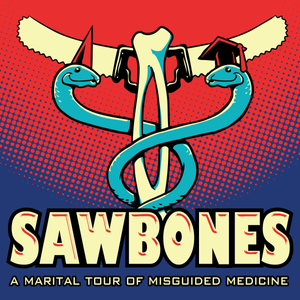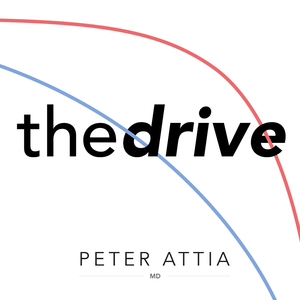
From Fear to Freedom: How Reiki Can Transform Recovery
05/29/24 • 18 min
Dr Ferghal introduces us to Helen, a Reiki master, who delves into the origins of Reiki and its application in addiction recovery. Discover the transformative power of Reiki healing and how it can complement traditional methods of treatment for substance use disorders.
Gain insights into the emotional causes of addiction and explore how Reiki can aid in relapse prevention and detoxification. Join us as we unravel the potential of Reiki in supporting individuals on their journey to recovery from addiction.
**Focus Keyword:**
Reiki in Addiction Recovery
**Key Points:**
Learn about the origins of Reiki and how it was discovered by Mikaya in the 18th century.
Understand the Reiki healing process and how it can help individuals release fear and emotional traumas.
Explore the role of Reiki in addiction recovery, including aiding in detoxification, relapse prevention, and addressing underlying emotional causes of addiction.
Discover the levels of Reiki attunements and the benefits of each stage in personal healing and helping others.
**Quote:**
"Ask not why the drug, but why the pain." - Dr Ferghal Armstrong
**Learning Outcomes:**
1. Understand the origins of Reiki and its connection to traditional healing practices.
2. Explore the role of Reiki in releasing fear and emotional traumas in addiction recovery.
3. Learn about the levels of Reiki attunements and their significance in personal healing and growth.
4. Discover the potential benefits of Reiki in detoxification, relapse prevention, and addressing the emotional root causes of addiction.
**Actionable Takeaways:**
1. Consider incorporating Reiki as a complementary therapy in addiction recovery programmes to support emotional healing.
2. Explore the practice of Reiki for personal healing and self-care, starting with Reiki Level 1 attunement.
3. Investigate the role of Reiki in reducing fear and anxiety during the recovery process and consult with a Reiki master for guidance.
4. Reflect on the emotional causes of addiction and how Reiki may assist in addressing and releasing these underlying issues.
Dr Ferghal introduces us to Helen, a Reiki master, who delves into the origins of Reiki and its application in addiction recovery. Discover the transformative power of Reiki healing and how it can complement traditional methods of treatment for substance use disorders.
Gain insights into the emotional causes of addiction and explore how Reiki can aid in relapse prevention and detoxification. Join us as we unravel the potential of Reiki in supporting individuals on their journey to recovery from addiction.
**Focus Keyword:**
Reiki in Addiction Recovery
**Key Points:**
Learn about the origins of Reiki and how it was discovered by Mikaya in the 18th century.
Understand the Reiki healing process and how it can help individuals release fear and emotional traumas.
Explore the role of Reiki in addiction recovery, including aiding in detoxification, relapse prevention, and addressing underlying emotional causes of addiction.
Discover the levels of Reiki attunements and the benefits of each stage in personal healing and helping others.
**Quote:**
"Ask not why the drug, but why the pain." - Dr Ferghal Armstrong
**Learning Outcomes:**
1. Understand the origins of Reiki and its connection to traditional healing practices.
2. Explore the role of Reiki in releasing fear and emotional traumas in addiction recovery.
3. Learn about the levels of Reiki attunements and their significance in personal healing and growth.
4. Discover the potential benefits of Reiki in detoxification, relapse prevention, and addressing the emotional root causes of addiction.
**Actionable Takeaways:**
1. Consider incorporating Reiki as a complementary therapy in addiction recovery programmes to support emotional healing.
2. Explore the practice of Reiki for personal healing and self-care, starting with Reiki Level 1 attunement.
3. Investigate the role of Reiki in reducing fear and anxiety during the recovery process and consult with a Reiki master for guidance.
4. Reflect on the emotional causes of addiction and how Reiki may assist in addressing and releasing these underlying issues.
Previous Episode

Could You Be Missing This Critical Vitamin?
In this episode, Dr Ferghal Armstrong and Dr Richard Bradlow unpack the complex relationship between alcohol, thiamine deficiency, and the severe neurological condition Wernicke’s encephalopathy. Ferghal opens by questioning long-held beliefs about alcohol’s direct effects on thiamine absorption, while Richard provides a contextual understanding of the symptomatic manifestations. The discussion touches on the practicalities of diagnosing and treating thiamine deficiency, focusing particularly on clinical scenarios where immediate action can prevent irreversible damage.
**Learning Outcomes**
1. **Understanding Thiamine Deficiency and Alcohol Use**
Thiamine deficiency is commonly seen in individuals with alcohol use disorders due to poor diet, liver damage, and compromised gut integrity. Ferghal emphasises that alcohol does not directly reduce thiamine but affects its absorption and storage indirectly.
Recognise the critical symptoms of thiamine deficiency: Ataxia, ophthalmoplegia, and confusion. Richard shares that only 10% of individuals present with the classic triad, stressing the need for a low threshold in administering thiamine.
Ferghal reveals that thiamine is stored in the liver, with approximately 20-30 milligrams available. Without replenishment, these levels deplete quickly, making regular intake essential.
2. **Diagnosis and Management**
Learn to assess risk factors beyond alcohol consumption. Richard suggests evaluating diet, liver health, and any conditions that hamper gut absorption.
Understand the importance of high-dose, parenteral thiamine administration in suspected cases of Wernicke’s encephalopathy. This prevents irreversible neuronal damage, particularly in the cerebellum and midbrain.
Find out why rapid thiamine delivery is critical. Ferghal explains that alcohol withdrawal demands a higher energy output, which depletes thiamine stores faster, precipitating encephalopathy.
3. **Preventative Measures and Harm Reduction**
Recognise the importance of thiamine supplements for those engaging in hazardous drinking, even if not experiencing withdrawal. Richard advocates for over-the-counter vitamin B1 tablets, taken multiple times daily for optimal absorption.
Explore how diet can play a crucial role in preventing thiamine deficiency. Liver, cereals, and fortified foods are excellent sources of thiamine, as Ferghal points out.
Koraskoff’s syndrome is an irreversible consequence of untreated thiamine deficiency. It leads to significant memory deficits and an ataxic gait, which underscores the need for timely intervention.
**Actionable Takeaways**
1. **Routine Screening for Thiamine Deficiency**
Incorporate routine screening for thiamine deficiency in patients with alcohol use disorder. Ferghal and Richard highlight this as a vital practice to prevent conditions like Wernicke’s encephalopathy and Korsakoff syndrome.
Develop a checklist for evaluating risk factors, including dietary patterns, liver function, and gut health issues.
Push for early intervention even with subclinical symptoms. Ferghal stresses the colossal benefits of early detection and treatment.
2. **Educate on Thiamine Supplementation**
Ensure patients receive clear instructions on thiamine supplementation. Richard recommends oral vitamin B1, taken in divided doses throughout the day.
Cultural and dietary recommendations should include foods rich in thiamine, like liver and fortified cereals.
Advocate for harm reduction strategies that include vitamin supplements. Ferghal points out this can significantly reduce the risk of severe neurological...
Next Episode

Synthetic Drugs You Never Knew Existed
Are you curious about the hidden dangers lurking in the world of synthetic opioids? In this episode of "Cracking Addiction," Dr Ferghal Armstrong sits down with the incredible Prof. Suzanne Neilsen, Deputy Director of the Monash Addiction Research Centre, to dive deep into the chilling rise of nitazenes in Australia. As high-potency synthetic opioids, nitazenes are causing waves of concern, and their impact could be closer to home than you think.
What's a nitazene, you ask? These potent synthetic opioids came into existence through pharmaceutical research in the 1950s but are now making a perilous comeback in the illicit drug scene. As Suzanne and I chat, we unravel why these forgotten compounds are suddenly re-emerging and the harrowing effects they have, particularly respiratory depression. Also, did you know that nitazine contamination could be lurking in various recreational drugs like MDMA or ketamine, posing a lethal threat unexpectedly?
But don't just take my word for it—watch the video and have your questions answered by one of Australia’s leading experts in addiction research. Prof. Neilsen steps us through the nuances of these dangerous compounds, their presence in recreational drugs, and the life-saving importance of naloxone for overdose reversals.
**Learning Outcomes:**
1. **Understanding Nitazines:**
Learn about Nitazenes, their chemical structure, and why they are considered highly potent opioids.
Suzanne reveals that although they were initially developed for potential therapeutic uses, their severe side effects, including significant respiratory depression, halted their progress.
Discover the historical context that has led to their re-emergence in the illicit drug scene.
Recognise the distinction between different types of Nitazenes and their varying potencies and half-lives.
2. **Risk Awareness and Harm Reduction:**
Understand the risks associated with Nitazene contamination in various illicit drugs, such as MDMA, ketamine, and cocaine.
Gain insights into how synthetic opioids like Nitazenes and fentanyl increase the danger of overdose due to their potency and rapid onset.
Develop awareness of the “sloppy drug dealer” theory and its implications for contamination.
Learn about the broadening need for harm reduction initiatives that address not just opioid users but anyone using illicit drugs.
3. **Importance of Naloxone:**
Comprehend the role of naloxone in reversing opioid overdoses, even caused by potent synthetic opioids like Nitazenes.
Learn about the potentially higher doses of naloxone required to reverse nitazene-induced overdoses.
Understand the importance of having multiple doses of naloxone on hand and the implications for stocking it in harm reduction services.
Recognise the balance needed in administering naloxone to avoid severe withdrawal symptoms in patients.
**Actionable Takeaways:**
1. **Increasing Awareness and Education:**
Educate yourself and your community about the dangers of synthetic opioids like nitazenes.
If you’re in a position to influence policy, advocate for expanding drug-checking services to help identify contaminants before use.
Spread the word about the importance of having naloxone readily available, especially in communities at risk.
Support initiatives that provide harm reduction training to a broad audience, including those who might not identify as opioid users.
2. **Advocating for Harm Reduction Services:**
Push for the establishment and funding of drug checking services in all states and territories, not just limited areas.
Encourage local governments and organisations to support evidence-based harm reduction services.
Participate in or initiate community...
If you like this episode you’ll love
Episode Comments
Generate a badge
Get a badge for your website that links back to this episode
<a href="https://goodpods.com/podcasts/cracking-addiction-406541/from-fear-to-freedom-how-reiki-can-transform-recovery-56846121"> <img src="https://storage.googleapis.com/goodpods-images-bucket/badges/generic-badge-1.svg" alt="listen to from fear to freedom: how reiki can transform recovery on goodpods" style="width: 225px" /> </a>
Copy




